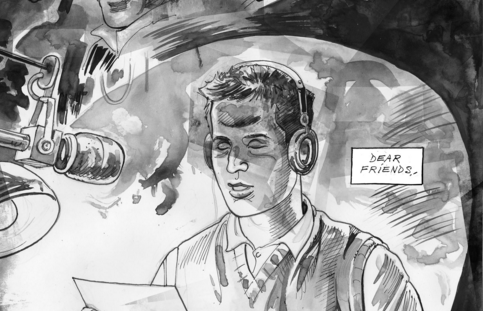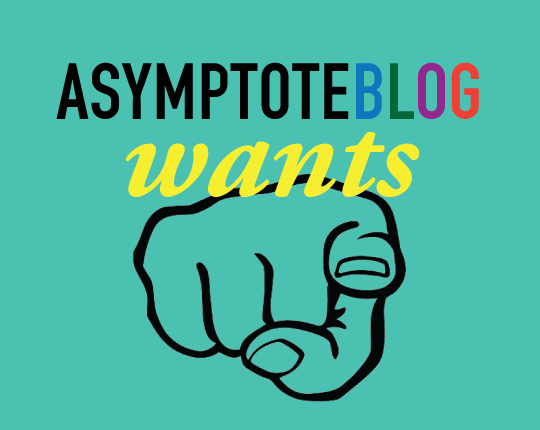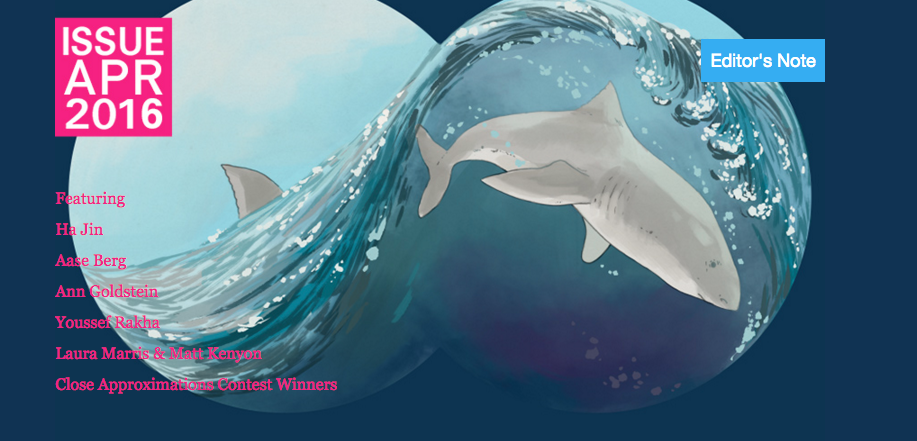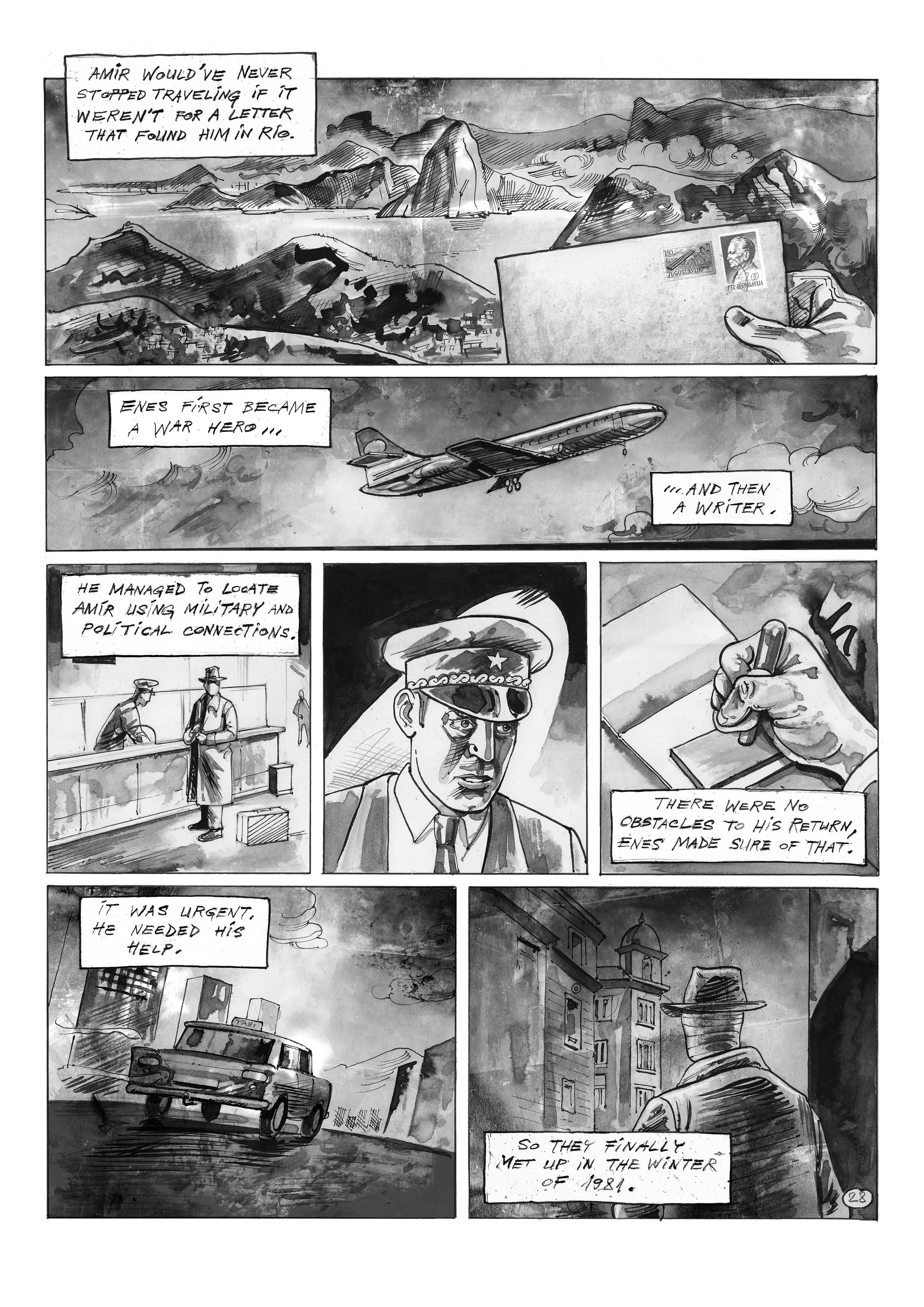Translation is often asked to be a silent art, an art so subtle that the reader never even sees a ripple in the translator’s wake. The translator is asked to tread softly, to follow an arbitrary measure of “accuracy” or “faithfulness.” This is precisely why Sawako Nakayasu’s Mouth: Eats Color: Sagawa Chika Translations, Anti-translations, & Originals is so brilliant. Within these pages, Nakayasu is at once invisible and intensely present, creating not a translation that masquerades as a stand-in for the original, but rather a translation that works to create new and exciting pieces that coexist alongside the original poetry. READ MORE…
Posts filed under 'literature'
Twenty Promenades: Mouth Eats Color in Review

"...translations can never be approached as though they were original texts—even though this is so often the case."
Weekly News Roundup, 29th April 2016: 400 Years Without Cervantespeare

This week's literary highlights from across the world
Hey, happy Friday, Asymptote! This week marks two extra-special, European four-hundred-year anniversaries: it’s the week of Spanish literary icon Miguel de Cervantes’ death, and there’s all sorts of commemoration: Spain celebrated the Don Quixote author with national celebrations and literary awards, but if you’re unable to make it in person, take a virtual trip to La Mancha. And English poet/thespian/legend William Shakespeare, too, died four hundred years ago (1616 was a killer year, huh?), so the commemorations are similarly virtual and literal (in case you’re curious, here’s a Proust Questionnaire with the Bard). And lest you forget (as much of Shakespeare and Cervantes can be found in the open domain) April 23 was also the UNESCO’s world book copyright day.
Asymptote‘s latest issue hit the digital shelves on Friday, and there’s so much to read: in addition to featuring poems by the late Tomaž Šalamun and brand-new verse from Aase Berg’s Hackers, (translated from the Swedish by Johannes Göransson), you can read interviews with Ferrante/Levi translator Ann Goldstein and literary heavyweight/literary “improbability” Ha Jin. But it doesn’t end there: at long last, this issue features the winners of our Close Approximations contest, but among so many other “regular” journal offerings, it’s hard to know where to start. In true blog tradition, we’ve picked favorites from the latest release. The list, we insist, is by no means exhaustive; you really can’t go wrong at all—dig in! READ MORE…
Weekly News Roundup, 15th April 2015: So. Many. Shortlists.

This week's highlights from across the world
Happy Friday, Asymptoters! This Friday’s an especially good one, because if we’ve timed the post correctly, because it means a new issue is totally live! There are so, so many gems in this issue, (as per usual). But this one also features the winners of our Close Approximations contest—be sure to check out the fiction, nonfiction, and poetry winners (and runners-up)!
This week, our very own Megan Bradshaw reported from the (frightening) field at the 2016 London Book Fair. Other notes from the (not-so) Fair: translators champion books in underrepresented languages and literatures. And the Book Fair announces its International Excellence Award winners: Words Without Borders is this year’s winner of the Publishers Weekly Literary Translation Initiative Award—the very same prize we won last year!—big congrats, WWB!
Speaking of prizes: the Man Booker International Prize has announced its shortlist, which includes Italian anonymon Elena Ferrante, South Korean trendsetter Han Kang (for The Vegetarian, translated by Deborah Smith), among others. The Bailey’s Women’s Prize for Fiction has similarly announced its shortlist. And yet another shortlist, this time for the 100,000-pound International Dublin Literary Award: featuring Jenny Erpenbeck, Marilynne Robinson, and many others. And shortly after the American PEN awarded its prizes this week, English PEN reflects on the notion of “reputation” with regard to non-Anglophone writers.
Also, at the Rumpus, a look behind-the-scenes: here’s an interview with writer and translator (from the Korean) Minsoo Kang, translator most recently of The Story of Hong Gildong. If you’re interested in what goes on in one of the biggest (or perhaps *the* biggest, full stop) powerhouse publications, read this interview with the editor of the New York Times Book Review, Pamela Paul. And if you’re still thinking about the Close Approximations prizewinners—don’t worry, we won’t judge you—read about our poetry judge, Michael Hofmann, here portrayed as a kind of literary daredevil of sorts.
Weekly News Roundup, 18th March 2016: We Verb Hard

This week's literary highlights from across the world
Happy Friday, Asymptote! Did you miss the roundup last week? The podcast went up instead, and if you missed it, take a listen (especially recommended for traffic jams and spring cleaning sessions). This episode features highlights from our fifth-anniversary New York event—FOMO, begone. READ MORE…
Graphic Novel in Translation: Karim Zaimović’s “The Invisible Man from Sarajevo,” Part V

Part V in Asymptote blog's first-ever graphic novel in translation
Weekly News Roundup, 29 January 2015: Great on Paper

This week's literary highlights from across the world
What’s up, Asymptote friends? We’re nearing the end of January, which means this is the time for checking in on those good intentions. You might want to consider a well-intentioned check-in at Asymptote blog columnist Anaïs Duplan’s awesome Kickstarter campaign for the Center for Afrofuturist Studies in Iowa City. Take a look, and support friends (and friends of friends) of Asymptote blog!
Speaking of sponsorships: Scotland has inaugurated its first translation fund, which mean that English-speaking readers can expect some literature from Macedonia, Albania, Norway, and Spain (among others). And our friends at Words Without Borders have opened up nominations for the 2016 Ottaway Award for the Promotion of International Literature (past winners include Carol Brown Janeway and Sara Bershtel).
Weekly News Roundup, 22 January 2015: Armchair Travel, Twilight Bio

This week's literary highlights from across the world
Happy Friday, Asymptote readers! If you’re in the Northern Hemisphere, you might be itching for warmer climes—though budgetary constraints mean that armchair travel‘s your only option. Take to this list of the Guardian‘s best-of world literature if you’d like handheld globetrotting.
We frequently report on literary awards here at the roundup—in fact, it seems like every week there’s a new accolade—but rarely do these awards go to books published over a year before. Not so for scholarly translations: an 80-year-old work of journalism and ethnography by Russian writer Vladimir Gilyarovsky, Moscow and the Muscovites, has snagged the 2015 AATSEEL Award for Best Scholarly Translation into English (the translator is Brendan Kiernan). Congratulations! READ MORE…
Asymptote Blog wants YOU to write on topical issues!

Asymptote blog seeks new contributions on current cultural events and political issues.
“Look at the rose through world-colored glasses,” Lawrence Ferlinghetti wrote. In this spirit, Asymptote is now seeking (translated) poetry and nonfiction directly responding to global issues and worldwide cultural events for publication on our blog.
Subjects can vary widely: the ongoing Syrian refugee crisis, the Paris attacks, the work of recent prize-winning writers, anniversaries of significant cultural events, even the release of the new Star Wars film. From politics to pop culture phenomena, we are looking for new writing on the most up-to-date global events.
Like our journal, we are looking for creative, original, and highly engaging work that is translated into English, or consider how translation plays a role in these events.
The goal of this new blog series is to share responses to the most current matters from all over the world, not just its English-speaking territories, and to encourage writers of all stripes to engage with these issues and events.
***
Recent highlights from the blog include:
Alberto Chimal’s essay on Star Wars (aka La guerra de las galaxias [War of the Galaxies]) in Mexico, translated by George Henson
Allegra Rosebaum’s “Spectacle Shopping,” her analysis of Black Friday through the lens of Guy Debord’s La Société du spectacle
“Say Ayotzinapa,” a special feature in which David Huerta’s poem “Ayotzinapa,” written in response to mass kidnappings and killings in a small town in Guerrero, Mexico, was translated into 20 languages
Jennifer Croft’s “When an Author You Translate Gets Death Threats,” a comprehensive essay which detailed the intense online criticism of Polish writer Olga Tokarczuk and Nobel-winner Svetlana Alexievich’s defense of Tokarczuk
Ryan Mihaly’s “Translating Indigenous Mexican Writers: An Interview with Translator David Shook,” posted on Columbus Day/Indigenous Peoples’ Day, which discussed the controversial holiday
***
Non-fiction submissions should be no more than 1500 words. Translations into English are preferred over submissions originally in English. Send your submissions, pitches or queries to blog editors Ryan Mihaly and Patty Nash at blog@asymptotejournal.com. Send us your best, most critically engaged and creative writing on the important matters of the day. Rolling deadline.
Weekly News Roundup, 8 January 2016: Happy New Year!

This week's literary highlights from all across the world
It’s the first news roundup of the new year—and I’m still stuck in the last one: I very nearly typed “2015.” Lots of good things happened since we last caught up—not least of which that Asymptote happily reached its Indiegogo goal (“Indiegogoal?”)! This means you can look forward to our fifth-anniversary celebrations in fifteen events happening all across the globe between now and April. And don’t forget: we’ve extended the deadline for our translation contest—scramble your materials and get it together by February 1st for a chance at literary wealth, fame, and renown!
In this episode, we look at divergent forms of storytelling in translation—from the fact-centered world of literary reportage to the poetic proclamations of a third-millennium heart. Beatrice Smigasiewicz brings us coverage from Krakow’s Conrad Festival, where she caught up with one of Poland’s most prominent writers of literary nonfiction, Mariusz Szczygieł, and his award-winning translator, Antonia Lloyd-Jones. They discuss the legacy of 20th century reportage in Polish literature and the power of storytelling in dealing with the country’s wartime experience and postwar Communist era. Katrine Øgaard Jensen presents new translations of poems from Ursula Andkjær Olsen’s Third-Millennium Heart, an explosive collection that pushes story to the limit—breaking every rule of storytelling and yet bringing us a character who feels real. Olsen won the prestigious literary award Montanaprisen in 2013 for the book, excerpted here in its original Danish along with English translations.
Podcast: Play in new window
| Download
Conversations in Absentia/Invisible Voices: the 2015 Indo-American Arts Council Literary Festival

"It creates a desperately needed space to discuss, underscore, and broadcast South Asian writing in one of the world’s largest literary capitals."
The first thing one notices at the venue of the 2nd annual Indo-American Arts Council Literary Festival is the number of Indians in various gradations of “Indian Attire”—from the skimpy Bollywood sari, to the elegant Kanjivaram, to the ubiquitous sherwani with a baseball cap. Such South Asian exuberance against the drab backdrop of Hunter College’s linoleum floors, dubious escalators, and gray dry-wall is enough to pique anyone’s interest, let alone a bunch of homesick Indian bibliophiles waiting to take selfies with their favorite writers.
An ambitious attempt on the part of the Indo-American Arts Council, led by director Aroon Shivdasani, the Festival gathers together prominent Subcontinental voices as diverse as Salman Rushdie, Suketu Mehta, Meena Alexander, Padma Lakshmi and Mira Nair, as well as emerging writers like Sharbari Ahmed, Raghu Karnad, Manreet Sodhi Someshwar, Mira Jacob, and Tanwi Nandini Islam.
Only two years old, the Festival is in its nascent stages, and perhaps that is why the panel discussions at times felt disjointed, as did its choice of panelists. The topics often veered sharply from the literary into an ersatz representation of South Asian identity—India’s rich, politicized literary landscape got less than its proper share of attention in what is supposed to be a festival of literature. The opening panel comprised of Salman Rushdie and Suketu Mehta in conversation with Amitava Kumar, although brimful of witty lines and pictorial anecdotes, often detoured from a discussion on writing by these accomplished authors into scattered riffs on their pasts, their political affiliations, and their sense of belonging to the “Old Boys’ Club” of Bombay writers. These digressions not only alienated younger audience members but also missed the opportunity to center the discussion on the writers’ craft. To make matters worse, there were not enough checks and balances to prevent an audience member from indulging in frivolous and self-promoting questions, only to waste precious panel time. Also, conspicuous by their absence at the Festival were diaspora writers such as Vandana Khanna, Srikant Reddy, and Nalini Jones, just to name a few, who would have added greater value to the panels, but who were, for reasons unknown, not included.
Translation Tuesday: from The Atlantic Grows by Julie Sten-Knudsen

"Two moths have gone into the trap, their bodies are stuck to the paper, their wings are still flapping."
The Atlantic Grows investigates notions of family, colour and race, and specifically the relationship between two sisters who share the same mother and yet are divided – by their different fathers, by the colour of their skin, and by the Atlantic Ocean that separates their continents.
***
In the light of the desk lamp
that is yellower than the daylight
the skin of my hand looks almost green,
almost red, with a golden wash.
It is not white.
The wall is white.
The used tissues
and the unpaid bills are white.
My hand has a different colour. The colour has a name.
I learned it when I was small. I used it
in the kindergarten, in the recreation club after school
when I needed a felt tip
in that indeterminable shade of pink
to draw a fleshy arm or a face:
I need the skin-coloured one.
There was no other use for that felt tip.




